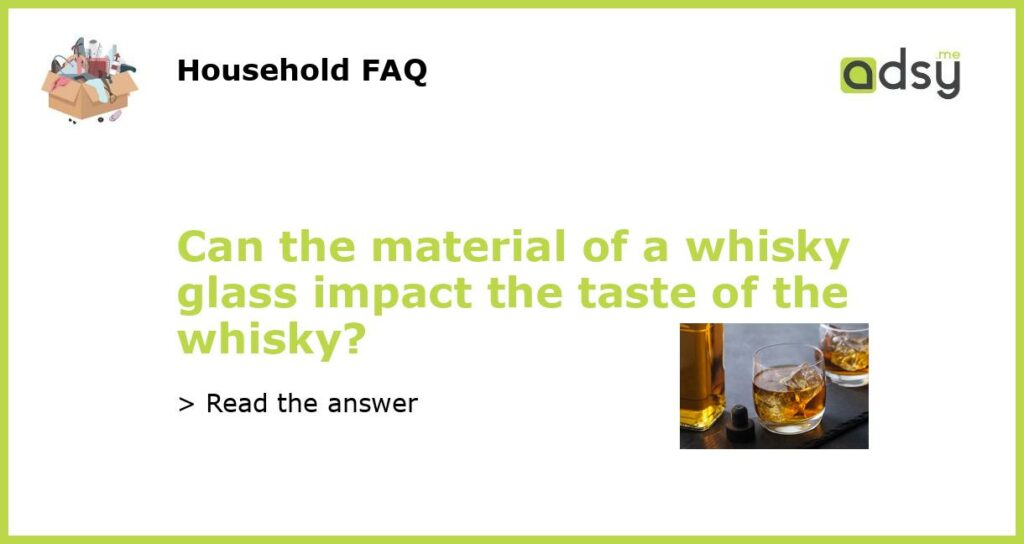Yes, the material of a whisky glass can impact the taste of the whisky.
Whisky connoisseurs and enthusiasts are always in pursuit of the perfect glass to enhance the drinking experience. It is believed that the material of the glass can significantly impact the taste, aroma, and overall enjoyment of the whisky. The glassware market offers a variety of options, including crystal, glass, and even metal glasses. Each material has its own unique characteristics that can affect the whisky’s flavor profile.
Glass vs Crystal: The Battle for Clarity
Glass and crystal are the most common materials used for whisky glasses. While they may appear similar, there are distinct differences between the two. Glass is made by melting silica, soda ash, and limestone at high temperatures, resulting in a more affordable and durable material. On the other hand, crystal is made with the addition of lead oxide, which gives it a higher refractive index and a more luxurious appearance.
Crystal glasses are known for their exceptional clarity, brilliance, and thinness. They allow for a more precise appreciation of the whisky’s color and visual characteristics. The higher refractive index of crystal can also enhance the play of light and create a more visually appealing experience. However, some argue that the lead content in crystal can interfere with the whisky’s flavor, potentially altering its taste profile.
Glass, on the other hand, is considered a safer choice for whisky enthusiasts. It does not contain lead, making it more suitable for those concerned about potential health risks. Glass also has a slight advantage in terms of durability, as it is less prone to chipping or breaking compared to crystal. However, the optical properties of glass may not be as impressive as crystal, resulting in a less visually stunning experience.
Enter Metal: The Unconventional Choice
While glass and crystal dominate the whisky glass market, there is a growing trend of using metal glasses for whisky tasting. Copper, stainless steel, and pewter are some of the metals used to create these unique vessels. Metal glasses offer a different drinking experience and can influence the whisky’s taste in unconventional ways.
Copper, for instance, is believed to interact with the whisky’s chemical compounds, particularly sulfur-based compounds. This interaction can reduce the pungent aromas often associated with certain whiskies, resulting in a smoother and more aromatic drinking experience. Stainless steel glasses, on the other hand, are known for their thermal properties, keeping the whisky at a constant temperature and preserving its flavor profile. Pewter glasses add a touch of elegance and historical charm to the whisky experience.
The Importance of Glass Shape
Beyond the material, the shape of the whisky glass also plays a crucial role in enhancing the tasting experience. The most common whisky glass shapes are the Glencairn, the tulip, and the copita. Each shape is designed to trap and concentrate the aromas, allowing the whisky’s complex flavors to be appreciated fully.
The Glencairn glass, with its wide base and narrow rim, is lauded for its ability to capture and intensify the whisky’s aroma. The tulip-shaped glass, similar to a wine glass, allows for swirling and aeration, enhancing the release of volatile compounds. The copita glass, often used in professional tasting sessions, is specifically designed to trap aromas and concentrate them near the rim for easier analysis.
The Verdict: It’s a Matter of Preference
While the material of a whisky glass can indeed impact the taste of the whisky, the ultimate choice depends on individual preferences and the specific characteristics of the whisky being enjoyed. Crystal glasses can offer a more visually stunning and luxurious experience, but their lead content may alter the flavor. Glass glasses, on the other hand, provide a safer and more durable option, while still allowing for an enjoyable whisky tasting experience.
For those seeking a unique and unconventional experience, metal glasses can provide a different interaction with the whisky’s compounds and offer specific benefits like temperature control or reduction of certain aromas.
Regardless of the material chosen, the shape of the glass is equally important. The right glass shape can enhance the whisky’s aroma and flavor, allowing for a more nuanced and enjoyable tasting experience. Ultimately, the material and shape of the whisky glass should complement and elevate the whisky’s qualities, adding to the overall enjoyment for the discerning whisky enthusiast.




![English Pewter Company 11oz Whisky Glass Tumbler with Monogram Initial - Personalised Gift with Your Choice of Initial (D) [MON104]](https://m.media-amazon.com/images/I/41hXSuAbT8L.jpg)

